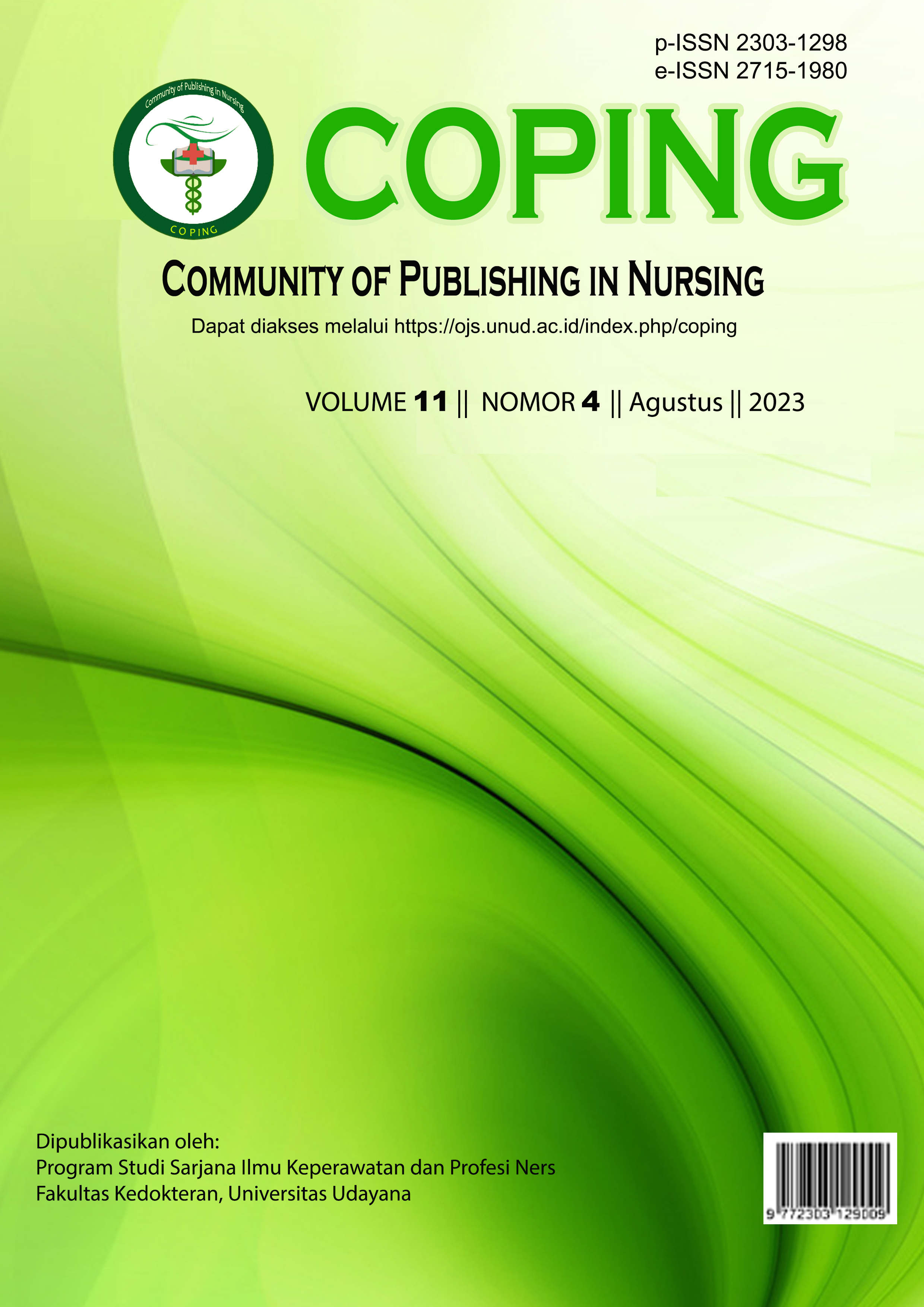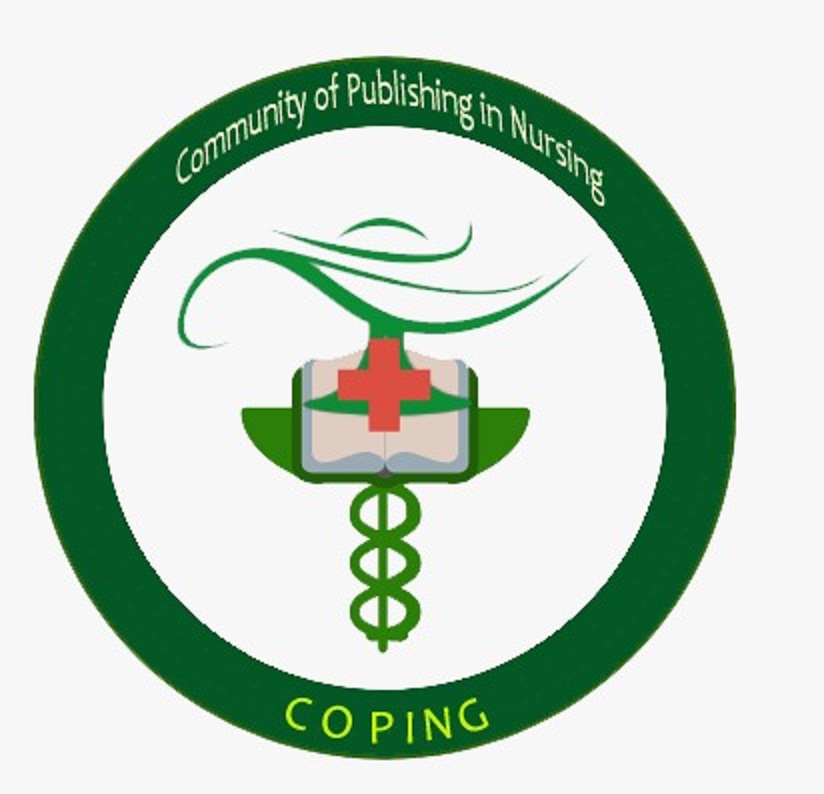GAMBARAN RESILIENSI PERAWAT RUMAH SAKIT UMUM DAERAH BALI MANDARA DI MASA PANDEMI COVID-19
Abstract
Resiliensi merupakan kemampuan seseorang dalam beradaptasi dengan baik saat menghadapi pengalaman yang sulit dan menantang. Resiliensi dapat dilihat baik secara positif maupun negatif. Tingkat ketahanan seseorang dapat bervariasi sangat dipengaruhi oleh keadaan individu dan tantangan yang dihadapi. Pandemi COVID-19 menyebabkan perawat mengalami situasi di bawah tekanan dan kekhawatiran permasalahan mental. Penelitian ini bertujuan untuk mengetahui gambaran resiliensi perawat Rumah Sakit Umum Daerah Bali Mandara di masa pandemi COVID-19. Penelitian ini merupakan penelitian deskriptif analitik dengan desain cross sectional. Sampel dalam penelitian ini berjumlah 78 responden yang diperoleh melalui teknik simple random sampling. Hasil penelitian diperoleh mayoritas responden berjenis kelamin perempuan (70,5%) dan sudah menikah (75,6%). Sejumlah 64,1% responden dengan pendidikan terakhir Ners, pengalaman bekerja >3 tahun (80,8%) serta sebagian besar bekerja di ruang isolasi COVID-19 (25,5%). Hanya 6,4% responden memiliki resiliensi dengan kategori rendah. Mayoritas responden memiliki resiliensi sedang adalah perawat pendidikan terakhir Ners (60,0%), sudah menikah (78,3%), lama bekerja >3 tahun (81,7%), dan bertugas di ruang rawat inap (23,3%). Sementara responden yang memiliki resiliensi kategori tinggi sebagian besar bertugas di ruang isolasi COVID-19 (69,2%) dan memiliki pengalaman bekerja >3 tahun (69,2%). Karakteristik responden diprediksi memiliki keterkaitan dengan level resiliensi yang dimiliki oleh perawat dalam penelitian ini.
Downloads
References
Cao, X., & Yu, L. (2019). Exploring the influence of excessive social media use at work: A three-dimension usage perspective. International Journal of Information Management, 46(July 2018), 83–92. https://doi.org/10.1016/j.ijinfomgt.2018.11.019
Connor, K. M., & Davidson, J. R. T. (2003). Development of a new resilience scale : The connor-davidson resilience scale (cd-risc). Depression and Anxiety, 82(September 2002), 76–82. https://doi.org/10.1002/da.10113
Dinas Kesehatan Bali. (2021). Rumah sakit rujukan di Bali.
Hanggoro, A. Y., Suwarni, L., Selviana, & Mawardi. (2020). Dampak psikologis pandemi covid-19 pada petugas layanan kesehatan : A studi cross-sectional di kota pontianak. Jurnal Kesehatan Masyarakat Indonesia, 15(2), 13–18.
Jackson, D., Firtko, A., & Edenborough, M. (2007). Personal resilience as a strategy for surviving and thriving in the face of workplace adversity: A literature review. Journal of Advanced Nursing, 60(1), 1–9. https://doi.org/10.1111/j.1365-2648.2007.04412.x
Junaedi, D., Arsyadi, M. R., Salistia, F., & Romli, M. (2022). Menguji efektivitas vaksinasi covid-19 di Indonesia. Religion Education Social Laa Roiba Journal, 4(1), 227–235. https://doi.org/10.47476/reslaj.v4i2.558
Khosidah, K., & Andriany, M. (2021). Resiliensi tahanan: Studi literatur. Holistic Nursing and Health Science, 4(2), 91–100. https://doi.org/10.14710/hnhs.4.2.2021.91-100
Lai, J., Ma, S., Wang, Y., Cai, Z., Hu, J., Wei, N., Wu, J., Du, H., Chen, T., Li, R., Tan, H., Kang, L., Yao, L., Huang, M., Wang, H., Wang, G., Liu, Z., & Hu, S. (2020). Factors associated with mental health outcomes among health care workers exposed to coronavirus disease 2019. JAMA Network Open, 3(3), 1–12. https://doi.org/10.1001/jamanetworkopen.2020.3976
Martini, D. E., Qowi, N. H., & Karsim. (2022). Self-efficacy sebagai faktor resiliensi perawat di ruang covid-19. Jurnal Penelitian Kesehatan Suara Forikes, 12. https://doi.org/10.33846/sf12nk325
Nuari, N. A. (2017). Resilience of efficacy perawat berbasis tingkat stres dan kepuasan kerja. Jurnal Kesehatan, 8(3), 375. https://doi.org/10.26630/jk.v8i3.642
Nurhidayah, S., Ekasari, A., Muslimah, A. I., Pramintari, R. D., & Hidayanti, A. (2021). Dukungan sosial, strategi koping terhadap resiliensi serta dampaknya pada kesejahteraan psikologis remaja yang orangtuanya bercerai. Paradigma Lembaga Penelitian Dan Pengabdian Masyakat, 18(1), 60–77. https://doi.org/10.33558/paradigma.v18i1.2674
Papalia, D. E., Sally, W. O., & Rut, D. F. (2009). Human development perkembangan manusia edisi 10 buku 2. Salemba Humanika.
Priningsih, F. (2022). Resiliensi perawat dalam melakukan pelayanan keperawatan di masa pandemi covid-19 di rumah sakit. Dohara Publisher Open Access Journal, 01(06), 220–226.
Rahayu, T. A., Pratikto, H., & Suhadianto. (2022). Self compassion dan resiliensi pada perawat pasien Covid-19. INNER: Journal of Psychological Research, 1(3), 103–111. https://aksiologi.org/index.php/inner/article/view/291
Robertson, H. D., Elliott, A. M., Burton, C., Iversen, L., Murchie, P., Porteous, T., & Matheson, C. (2016). Resilience of primary healthcare professionals: A systematic review. British Journal of General Practice, 66(647), e423–e433. https://doi.org/10.3399/bjgp16X685261
Rosyanti, L., & Hadi, I. (2020). Dampak psikologis dalam memberikan perawatan dan layanan kesehatan pasien covid-19 pada tenaga profesional kesehatan. Health Information : Jurnal Penelitian, 12(1), 107–130. https://doi.org/10.36990/hijp.vi.191
RSUD Bali Mandara. (2021). Protokol tatanan kehidupan baru sektor kesehatan di uptd. rsud bali mandara. Pemerintah Provinsi Bali Dinas Kesehatan Rumah Sakit Umum Daerah Bali Mandara. https://rsbm.baliprov.go.id/?p=778
Satuan Tugas Penanganan COVID-19. (2022). Data sebaran. https://covid19.go.id/
Setiawati, Y., Wahyuhadi, J., Maramis, M. M., & Atika, A. (2021). Anxiety and resilience of healthcare workers during covid-19 pandemic in indonesia. Journal of Multidisciplinary Healthcare, 1–8. https://doi.org/http://doi.org/10.2147/JMDH.S276655
Susiladewi, ida A. M. V., Yanti, N. P. E. darma, & Pradiksa, H. (2021). Pengaruh pelatihan dan pemberian video terhadap pengetahuan perawat tentang alat pelindung diri di masa pandemi coronavirus disease 2019. Jurnal Keperawatan, 13(1), 213–226.
Utami, N. L. S. W. (2021). RSUD bali mandara vaksin 1000 nakes dengan moderna, targetkan 3 minggu tuntas. Tribun Bali. https://bali.tribunnews.com/2021/08/05/rsud-bali-mandara-vaksin-1000-nakes-dengan-moderna-targetkan-3-minggu-tuntas
Wahyudiyono, W., Eko, B. R., & Trisnani, T. (2021). Persepsi masyarakat terhadap covid-19 pasca pemberlakuan pembatasan kegiatan masyarakat (PPKM). Jurnal Komunika: Jurnal Komunikasi, Media Dan Informatika, 10(2), 102. https://doi.org/10.31504/komunika.v10i2.4484
Widayanti, L. P., & Kusumawati, E. (2021). Hubungan persepsi tentang efektifitas vaksin dengan sikap kesediaan mengikuti vaksinasi covid-19. Hearty, 9(2), 78. https://doi.org/10.32832/hearty.v9i2.5400
Yaslina, Y., & Yunere, F. (2020). Hubungan jenis kelamin, tempat bekerja dan tingkat pendidikan dengan kecemasan perawat dalam menghadapi pandemi Covid-19. Prosiding Seminar Kesehatan Perintis E-ISSN : 2622-2256, 3(1), 63–69. https://www.jurnal.stikesperintis.ac.id/index.php/PSKP/article/view/569/286 [Diakses 5 Juli 2021].
Zaini, M. (2021). Resiliensi perawat selama masa pandemi covid-19. Jurnal Keperawatan Jiwa (JKJ): Persatuan Perawat Nasional Indonesia, 9(4), 779–786.

This work is licensed under a Creative Commons Attribution-NonCommercial 4.0 International License.







